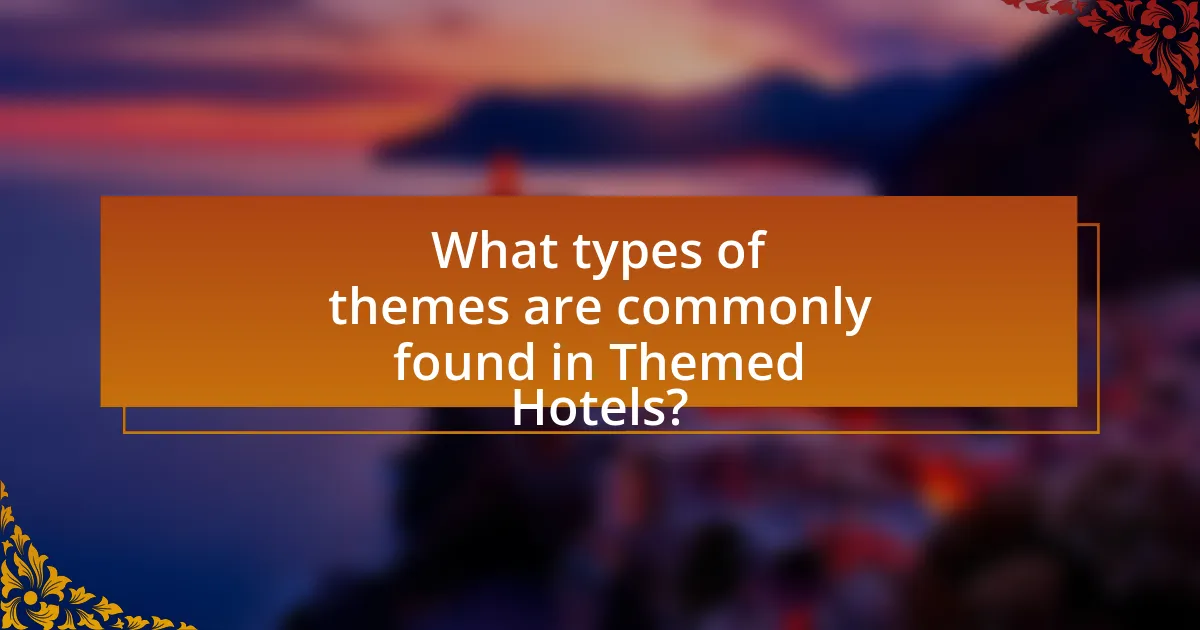Themed hotels are specialized accommodations designed around specific concepts, often inspired by movies, literature, or cultural elements, providing immersive experiences through themed decor, activities, and services. These hotels differ from traditional lodging by creating unique atmospheres that engage guests on multiple sensory levels, enhancing their overall experience. The article explores the growing popularity of themed hotels, driven by consumer demand for distinctive experiences, and examines how social media influences their appeal. It also discusses the various themes commonly found in these hotels, the role of design and storytelling in guest experiences, and offers tips for selecting and fully enjoying a themed hotel stay.

What are Themed Hotels?
Themed hotels are accommodations designed around a specific concept, theme, or narrative, often inspired by movies, literature, or cultural elements. These hotels create immersive experiences for guests by incorporating themed decor, activities, and services that align with the chosen concept. For example, a hotel themed around a popular film may feature rooms decorated with memorabilia, themed dining options, and staff dressed in costumes related to the movie. The popularity of themed hotels has grown, with many travelers seeking unique and memorable experiences that transport them into different worlds, as evidenced by the success of establishments like the Wizarding World of Harry Potter hotels, which attract fans and tourists alike.
How do Themed Hotels differ from traditional hotels?
Themed hotels differ from traditional hotels primarily in their immersive design and experience, which are centered around specific themes such as movies, literature, or cultural motifs. Unlike traditional hotels that typically focus on standard amenities and services, themed hotels create a unique atmosphere through decor, staff costumes, and themed activities that align with their chosen concept. For example, a hotel themed around a popular film may feature rooms designed to resemble sets from the movie, enhancing guest engagement and enjoyment. This approach not only attracts niche markets but also provides a memorable experience that distinguishes them from conventional lodging options.
What unique experiences do Themed Hotels offer guests?
Themed hotels offer guests immersive experiences that transport them into the worlds of movies, literature, or specific themes. These hotels often feature decor, furnishings, and staff uniforms that align with the chosen theme, creating an engaging atmosphere. For example, a hotel themed around a popular movie may include rooms designed to resemble sets from the film, while a literary-themed hotel might offer rooms inspired by famous novels. This level of detail enhances the guest experience, making it memorable and unique. Themed hotels also frequently provide activities and events related to their themes, such as movie screenings or literary discussions, further enriching the stay.
How do themes enhance the overall hotel experience?
Themes enhance the overall hotel experience by creating immersive environments that engage guests on multiple sensory levels. Themed hotels, such as those inspired by movies and literature, offer unique decor, tailored services, and specialized activities that transport guests into a different world, enhancing their emotional connection to the stay. For example, a hotel themed around a popular film may feature set designs, character interactions, and themed dining options, which can significantly increase guest satisfaction and memorable experiences. Research indicates that immersive experiences can lead to higher guest loyalty and increased likelihood of return visits, as guests are drawn to the novelty and creativity of themed accommodations.
Why are Themed Hotels gaining popularity?
Themed hotels are gaining popularity due to their ability to provide unique and immersive experiences that cater to specific interests and fantasies. This trend is driven by consumers’ desire for memorable travel experiences that go beyond traditional accommodations. According to a 2022 survey by the American Hotel and Lodging Educational Institute, 70% of travelers expressed interest in staying at hotels that offer distinctive themes or experiences, highlighting a growing market for such establishments. Additionally, themed hotels often leverage popular culture, such as movies and literature, to attract guests, creating a sense of nostalgia and connection that enhances customer engagement and satisfaction.
What trends are driving the growth of Themed Hotels?
The growth of themed hotels is primarily driven by the increasing consumer demand for unique and immersive experiences. This trend is supported by the rise of experiential travel, where guests seek accommodations that offer more than just a place to stay; they desire environments that reflect their interests, such as movies and literature. According to a report by the American Hotel and Lodging Educational Institute, 70% of travelers prefer hotels that provide distinctive experiences, highlighting the importance of thematic elements in attracting guests. Additionally, social media influences, where visually appealing and unique hotel designs are shared widely, further fuel interest and bookings in themed hotels.
How do social media and marketing influence Themed Hotels’ appeal?
Social media and marketing significantly enhance the appeal of themed hotels by creating engaging narratives and visual content that attract potential guests. Themed hotels leverage platforms like Instagram and Facebook to showcase their unique experiences, often using high-quality images and videos that highlight their immersive environments, which can lead to increased interest and bookings. For instance, a study by the American Hotel and Lodging Educational Institute found that 70% of travelers are influenced by social media when making travel decisions, underscoring the importance of a strong online presence. Additionally, targeted marketing campaigns can reach specific demographics, ensuring that the themed hotel resonates with the interests of potential guests, thereby boosting its overall attractiveness.

What types of themes are commonly found in Themed Hotels?
Themed hotels commonly feature themes such as fantasy, adventure, historical, and cultural motifs. For instance, fantasy themes often draw inspiration from popular movies and literature, creating immersive environments that transport guests into fictional worlds. Adventure themes may include elements like safari or nautical designs, appealing to those seeking excitement. Historical themes often reflect specific time periods or events, providing a unique glimpse into the past. Cultural motifs can showcase local traditions and heritage, enhancing the guest experience by connecting them to the destination’s identity. These themes are designed to create memorable experiences, as evidenced by the popularity of themed hotels in tourist destinations worldwide.
How do movie-inspired themes manifest in hotel design?
Movie-inspired themes manifest in hotel design through architectural elements, interior decor, and immersive experiences that reflect the aesthetics and narratives of popular films. For instance, hotels like the “The Wizarding World of Harry Potter” at Universal Orlando incorporate design features such as themed rooms, replicas of iconic sets, and staff dressed in character costumes, creating an environment that transports guests into the movie’s universe. Additionally, the “The Godfather” themed hotel in Sicily showcases decor that mirrors the film’s setting, including vintage furnishings and memorabilia, enhancing the thematic experience. These design choices not only attract fans but also create memorable stays that resonate with the cinematic experience.
What are some examples of hotels themed around popular films?
Some examples of hotels themed around popular films include the The Godfather-themed hotel in Sicily, which offers a unique experience reflecting the iconic movie’s setting, and the Harry Potter-themed hotel in London, where guests can immerse themselves in the wizarding world. Additionally, the Stanley Hotel in Colorado inspired Stephen King’s “The Shining,” providing a chilling atmosphere that attracts fans of the horror genre. These hotels incorporate elements from their respective films, enhancing the guest experience through themed decor and activities.
How do these hotels incorporate film elements into guest experiences?
Hotels incorporate film elements into guest experiences by offering themed rooms, immersive decor, and curated film screenings. For example, hotels like the Hotel del Coronado feature rooms inspired by classic films, complete with memorabilia and design elements that reflect the movie’s aesthetic. Additionally, some hotels host movie nights or provide in-room streaming services that allow guests to watch films related to the hotel’s theme, enhancing the overall experience. This approach not only creates a unique atmosphere but also engages guests by connecting them to the cinematic world, making their stay memorable and interactive.
What literary themes are represented in Themed Hotels?
Themed hotels represent literary themes such as escapism, nostalgia, and adventure. Escapism is evident as these hotels allow guests to immerse themselves in different worlds, reflecting the desire to escape reality, similar to how literature transports readers to new realms. Nostalgia is represented through themes that evoke memories of beloved stories or characters, creating a sense of familiarity and comfort. Adventure is highlighted by the unique experiences offered, encouraging guests to explore narratives and settings inspired by literature, much like protagonists in novels embark on journeys. These themes collectively enhance the guest experience, making themed hotels a unique intersection of hospitality and storytelling.
Which authors or literary works inspire hotel themes?
Authors such as Agatha Christie and literary works like “The Great Gatsby” inspire hotel themes. Agatha Christie’s mystery novels often lead to themed hotels that replicate the ambiance of her stories, such as the famous Orient Express. Similarly, “The Great Gatsby” by F. Scott Fitzgerald has inspired hotels that reflect the opulence and glamour of the Roaring Twenties, often featuring Art Deco designs and lavish parties reminiscent of the novel’s setting. These literary influences create immersive experiences for guests, allowing them to step into the worlds crafted by these authors.
How do these hotels create immersive environments based on literature?
Hotels create immersive environments based on literature by thematically designing their spaces to reflect the narratives, settings, and characters of specific literary works. For instance, hotels may incorporate decor, furnishings, and color schemes that evoke the atmosphere of a particular book, such as using Victorian-era furnishings for a Charles Dickens theme. Additionally, they often offer curated experiences, such as guided literary tours or themed dining options that align with the stories being represented. This approach is supported by the fact that immersive environments enhance guest engagement and satisfaction, as evidenced by studies showing that themed experiences can increase customer loyalty and emotional connection to the brand.

What are the key features of successful Themed Hotels?
Successful themed hotels incorporate immersive design, unique storytelling, and tailored guest experiences. Immersive design includes architecture and decor that reflect the theme, creating an engaging atmosphere. Unique storytelling involves crafting narratives that resonate with guests, often inspired by movies or literature, enhancing emotional connections. Tailored guest experiences, such as themed activities and specialized services, ensure that visitors feel fully immersed in the theme throughout their stay. These features collectively contribute to a memorable and distinctive hospitality experience, which is essential for attracting and retaining guests in a competitive market.
How do design and decor contribute to the theme?
Design and decor are essential in establishing the theme of themed hotels, as they create an immersive environment that reflects the narrative and aesthetic of movies and literature. For instance, the use of specific color palettes, furniture styles, and artwork can evoke the essence of a particular story or genre, enhancing the guest experience. Research indicates that immersive design elements, such as period-specific decor or thematic motifs, significantly influence guest satisfaction and engagement, making them feel as though they are part of the narrative. This alignment between design and theme not only attracts guests but also reinforces the hotel’s brand identity, leading to increased loyalty and repeat visits.
What role does storytelling play in the guest experience?
Storytelling plays a crucial role in enhancing the guest experience by creating immersive environments that engage visitors emotionally and intellectually. In themed hotels, narratives derived from movies and literature shape the ambiance, decor, and activities, allowing guests to feel as though they are part of a larger story. For instance, hotels inspired by popular films often incorporate elements such as themed rooms, character interactions, and story-driven events, which can significantly increase guest satisfaction and loyalty. Research indicates that immersive storytelling can lead to a 30% increase in guest engagement and a 20% boost in overall satisfaction ratings, demonstrating its effectiveness in transforming a standard stay into a memorable experience.
How do staff interactions enhance the themed experience?
Staff interactions enhance the themed experience by creating a more immersive and engaging environment for guests. When staff members embody the theme through their attire, language, and behavior, they reinforce the narrative and atmosphere of the hotel, making guests feel as though they are part of a story. For instance, in themed hotels inspired by movies, staff may adopt character roles, which not only entertains guests but also deepens their emotional connection to the theme. Research indicates that personalized interactions with staff can significantly increase guest satisfaction and loyalty, as highlighted in a study by the Cornell University School of Hotel Administration, which found that positive staff engagement leads to enhanced guest experiences and repeat visits.
What amenities are typically offered in Themed Hotels?
Themed hotels typically offer amenities that enhance the immersive experience related to their specific themes. Common amenities include uniquely designed rooms that reflect the theme, themed dining options that align with the hotel’s concept, and entertainment facilities such as themed shows or activities. Additionally, many themed hotels provide special services like character meet-and-greets, themed merchandise shops, and immersive experiences such as escape rooms or interactive exhibits. These amenities are designed to create a cohesive and engaging environment that resonates with the theme, ensuring guests have a memorable stay.
How do themed dining options complement the hotel experience?
Themed dining options enhance the hotel experience by providing guests with immersive culinary environments that reflect the hotel’s overall theme. These dining experiences allow guests to engage with the hotel’s narrative, creating a cohesive atmosphere that deepens their connection to the theme. For instance, a hotel themed around a specific movie may offer a restaurant that serves dishes inspired by that film, thereby enriching the storytelling aspect of the stay. This integration of dining and theme not only elevates guest satisfaction but also encourages longer stays and repeat visits, as evidenced by studies showing that unique dining experiences can significantly influence customer loyalty in the hospitality industry.
What entertainment options are available for guests?
The entertainment options available for guests at themed hotels inspired by movies and literature typically include immersive experiences such as themed dining, interactive performances, movie screenings, and literary-themed activities. These hotels often host events that allow guests to engage with the themes of the movies or books, such as costume parties, trivia nights, and guided tours of the hotel that highlight its unique design and storytelling elements. For example, a hotel themed around a specific film may feature decor and activities that reflect the movie’s setting and characters, enhancing the overall guest experience.
How can guests choose the right Themed Hotel for their stay?
Guests can choose the right themed hotel for their stay by identifying their interests and preferences related to the theme. For instance, if a guest enjoys classic literature, they should look for hotels that offer immersive experiences based on famous novels or authors. Additionally, guests should consider the hotel’s location, amenities, and reviews to ensure it aligns with their expectations. Research shows that themed hotels can enhance guest satisfaction by providing unique experiences that resonate with personal interests, as highlighted in studies on consumer behavior in hospitality.
What factors should guests consider when selecting a Themed Hotel?
Guests should consider the theme, location, amenities, and reviews when selecting a themed hotel. The theme should resonate with their interests, whether it’s based on movies, literature, or other concepts, as this enhances the immersive experience. The location is crucial for accessibility to attractions and activities related to the theme. Amenities, such as themed dining options and entertainment, can significantly enhance the stay. Lastly, reviews provide insights into the experiences of previous guests, helping to gauge the quality and authenticity of the themed experience.
How can guests find reviews and recommendations for Themed Hotels?
Guests can find reviews and recommendations for themed hotels through various online platforms such as TripAdvisor, Yelp, and Google Reviews. These platforms aggregate user-generated content, allowing guests to read firsthand experiences and ratings from previous visitors. Additionally, specialized travel blogs and websites often feature curated lists and detailed reviews of themed hotels, providing insights into unique aspects and guest experiences. Social media platforms like Instagram and Facebook also serve as valuable resources, where guests can view photos and comments from travelers who have stayed at these hotels, further aiding in their decision-making process.
What tips can enhance the experience at Themed Hotels?
To enhance the experience at themed hotels, guests should fully engage with the hotel’s unique offerings and immerse themselves in the theme. This can include participating in themed events, utilizing themed amenities, and exploring the surrounding area for related attractions. For instance, themed hotels often host special activities like movie screenings or literary discussions that align with their concept, providing guests with a deeper connection to the theme. Additionally, guests can enhance their experience by dressing in accordance with the theme, which can elevate the overall atmosphere and enjoyment. Engaging with staff who are often knowledgeable about the theme can also provide valuable insights and recommendations, further enriching the stay.
How can guests fully immerse themselves in the theme during their stay?
Guests can fully immerse themselves in the theme during their stay by engaging with themed activities, utilizing immersive decor, and participating in curated experiences. Themed hotels often offer activities such as movie screenings, literary readings, or interactive workshops that align with the hotel’s concept, enhancing the overall experience. Additionally, the decor and ambiance are meticulously designed to reflect the theme, allowing guests to feel as though they are part of the narrative. For instance, a hotel inspired by a specific film may feature set designs, costumes, and props that recreate iconic scenes, providing a tangible connection to the story. This combination of activities and environment fosters a deeper emotional engagement, making the stay memorable and immersive.
What are some common pitfalls to avoid when staying at a Themed Hotel?
Common pitfalls to avoid when staying at a themed hotel include overlooking the specific theme’s details, which can lead to disappointment in the overall experience. Guests should research the hotel’s theme to ensure it aligns with their interests, as some themed hotels may cater to niche audiences. Additionally, failing to check for amenities that match the theme can result in an unsatisfactory stay; for example, a hotel themed around a specific movie may not offer related activities or decor. Lastly, neglecting to read reviews can lead to unexpected issues, such as noise levels or service quality, which are often highlighted by previous guests.


